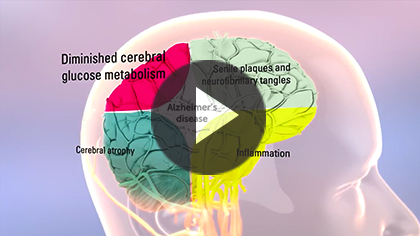Managing wandering*
There are ways to keep your loved one safe from wandering1,2
 It is very common for people with Alzheimer’s disease to wander away from their home or their caregivers. Walking itself is not a problem; it can be a great way to get exercise. However, wandering can be dangerous if the person with Alzheimer’s disease does not remember his or her name or address.
It is very common for people with Alzheimer’s disease to wander away from their home or their caregivers. Walking itself is not a problem; it can be a great way to get exercise. However, wandering can be dangerous if the person with Alzheimer’s disease does not remember his or her name or address.
There are many possible reasons for wandering. If you can identify the reason why your loved one wants to wander, you can start to find ways to meet his or her needs and keep your loved one safe. Keeping a journal for a few weeks and recording potential triggers may be helpful. Some possible reasons why your loved one would want to walk about may include relieving boredom, using up energy, relieving pain and discomfort, responding to anxiety, feeling lost, experiencing memory loss, searching for the past, seeking fulfillment, and getting confused about the time.
Tips to prevent wandering1,3
If your loved one wants to walk or wander, you should try to find a solution that lets him or her do so safely.
- Have a daily routine and provide structure during the day
- Ensure the person with Alzheimer’s disease carries identification or wears a medical bracelet
- Consider enrolling the person with Alzheimer’s disease in the MedicAlert® + Alzheimer’s Association Safe Return® Program. Go to www.alz.org or call 1-888-572-8566 for more information
- Let neighbors, friends, family members, and local police know that the person with Alzheimer’s disease tends to wander
- Keep a recent photograph or video recording of the person with Alzheimer’s disease to help the police if he or she becomes lost
- Keep doors at home locked and consider getting locks or deadbolts that cannot be opened by the person with Alzheimer’s disease
- Keep car keys out of sight
- Provide supervision – Never leave the person with Alzheimer’s disease at home alone or in a car without supervision


